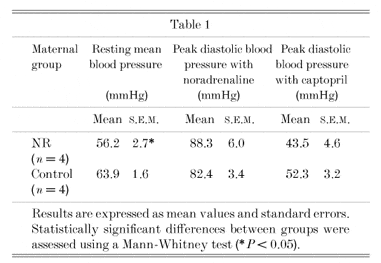Maternal nutrient restriction over the period of rapid placental growth (i.e. 30-80 days), followed by adequate nutrition up to term, results in a longer fetus with a disproportionately larger placenta (Heasman et al. 1998). These individuals may be at increased risk of adult diseases including hypertension (Barker, 1995). The aim of this study was to determine the consequences on blood pressure control in offspring born to nutrient-restricted (NR) ewes between early to mid-gestation.
Eight Welsh Mountain ewes of similar body weight and fat distribution were individually housed from 28 days gestation. Four ewes were fed a NR diet (3.5 MJ day-1) until 80 days gestation, or control (C) diet (6.8-7.5 MJ day-1). After 80 days gestation, until term (147 days), all animals consumed 6.8-7.5 MJ day-1, sufficient to fully meet their metabolisable energy (ME) requirements to produce a 4.5 kg lamb at term. Lambs were born spontaneously and at 6 months of age, a carotid artery and jugular vein were surgically catheterised under fluothane anaesthesia to allow measurement of blood pressure and drug administration. At least 2 days after surgery, mean, systolic and diastolic blood pressure were measured for a resting period of 30 min, before a continuous infusion of noradrenaline with dose increases (0.5-32 ng kg-1 min-1) at 10 min intervals or captopril with dose increases (0.12 mg kg-1 h-1) at hourly intervals. All procedures were carried out according to UK legislation.
Lambs born to NR ewes were heavier than those born to controls. There was no difference in growth rate up to 6 months, when resting systolic and mean blood pressure were lower in lambs born to NR ewes (P < 0.05). There was no statistical difference between groups for peak blood pressure response at the maximal dose of noradrenaline, although the rise in blood pressure between resting and peak recordings was greater in lambs born to NR ewes (NR mean 45.3, S.E.M. 4.8; C mean 32.0, S.E.M. 2.0 mmHg (P = 0.07)). In contrast the decrease in blood pressure following captopril infusion was of a similar magnitude between groups.
Nutrient restriction between early to mid-gestation, followed by adequate feeding up to term, is associated with larger offspring who exhibit lower blood pressure at 6 months and a greater sensitivity to a vasoconstrictor but not a vasodilator challenge.
G. Gopalakrishnan was supported by a British Heart Foundation studentship.

